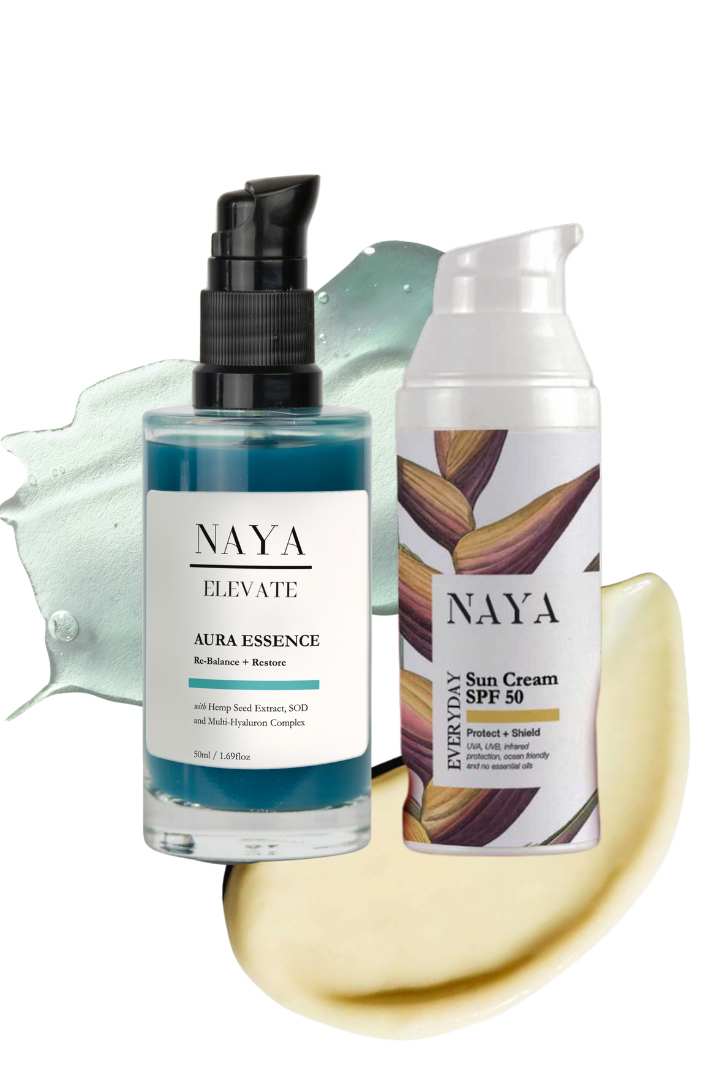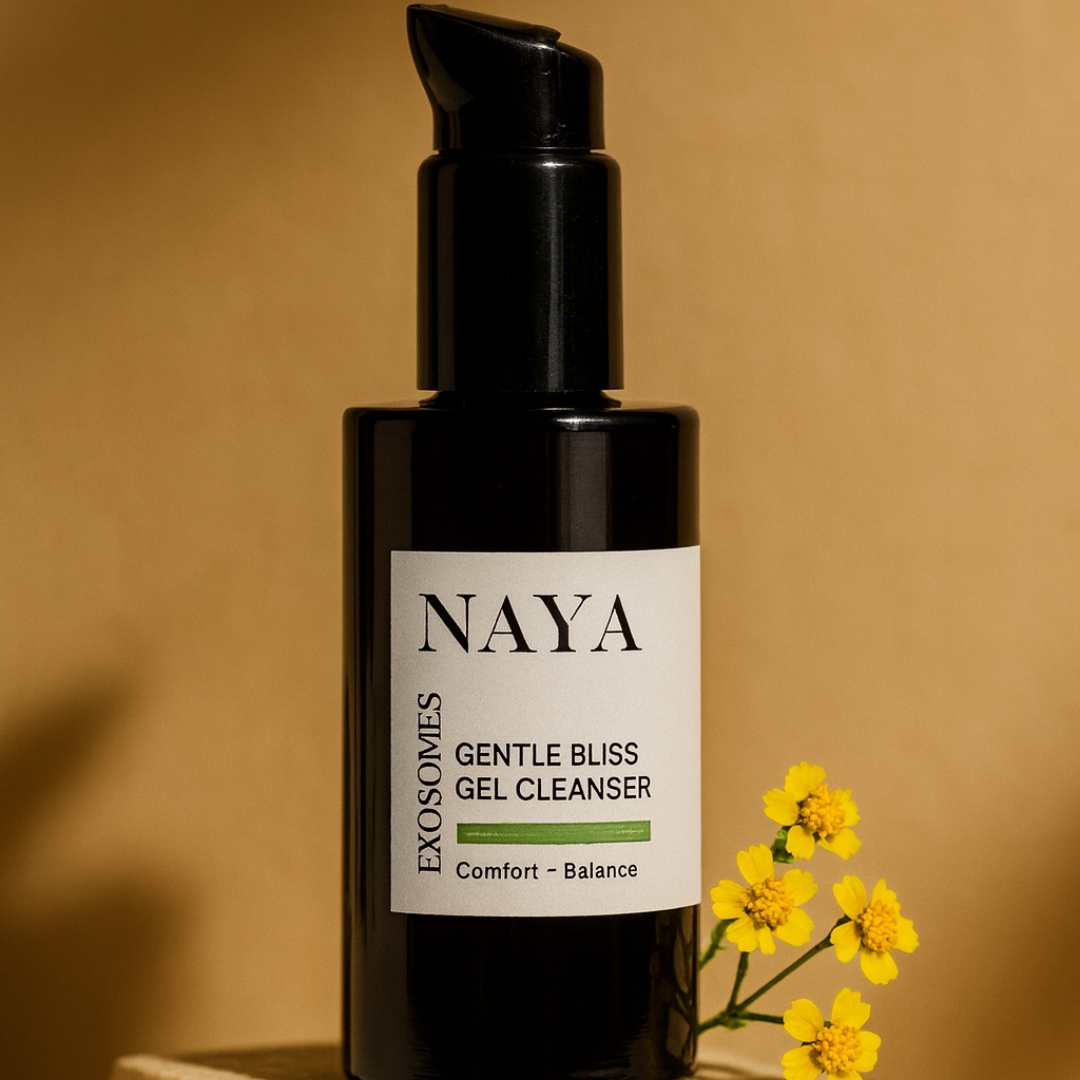Granatapfelöl: Wirkung, Anwendung und Vorteile in der Hautpflege
Warum verwenden wir Granatapfelöl?
Wie wächst der Granatapfel?
Der Granatapfelbaum (Punica granatum) verzaubert mit seinen granatroten Früchten, die an große Äpfel erinnern. Seit der Antike ist der Granatapfel ein Symbol für Fruchtbarkeit und Macht aufgrund der vielen Kerne. Er enthält viele Inhaltsstoffe, die wertvoll für Gesundheit und Schönheit sind und ist derzeit als Superfood und kosmetischer Inhaltsstoff sehr gefragt.
Der Granatapfelbaum, der zur Myrtenfamilie gehört, ist in West- bis Zentralasien, im Mittelmeerraum und im Nahen Osten beheimatet.

Wie wird Granatapfel verwendet?
Die Schale des Granatapfels wurde traditionell als Farbstoff für Wolle und wertvolle orientalische Teppiche verwendet. Das Fruchtfleisch und der Saft können für Obstsalate genutzt werden, aber auch zur Verfeinerung von Geflügel- und Wildgerichten. Granatapfelwein kann aus dem süßen, aromatischen Saft gewonnen werden.
Granatapfelöl wird aus den getrockneten und gepressten Kernen der reifen Frucht gewonnen. Es handelt sich um ein sehr kostbares Öl. Für 500 Gramm Öl werden etwa 100 Kilogramm Granatäpfel benötigt.
Das ist nicht überraschend, da die öligen Kerne nur etwa 3 Prozent des Gewichts eines Granatapfels ausmachen. Der Ölgehalt in den Kernen liegt zwischen 12,0 und 20,0 Prozent. Granatapfelöl hat einen angenehmen nussigen Duft und eine helle bis goldgelbe Farbe.
In der Küche wird Granatapfelsamenöl verwendet, um Gerichte und Salate zu verfeinern.
Intern wird es als Nahrungsergänzungsmittel eingesetzt, um das Immunsystem zu stärken, Arthritis zu lindern, Bluthochdruck zu senken, Cholesterinwerte zu regulieren und Symptome der Menopause zu lindern.
Es wurde bereits von den alten Persern als Schönheitsöl für Haut und Haare verwendet und wird auch heute noch für kosmetische Zwecke genutzt.

Wirksamkeit des Granatapfels
Granatapfelöl zeichnet sich durch ein einzigartiges Fettsäureprofil aus, mit Punicinsäure im Zentrum. Diese mehrfach ungesättigte Fettsäure, die zu den Omega-5-Fettsäuren gehört, kommt nur in wenigen anderen pflanzlichen Ölen vor.
In Granatapfelöl macht Punicinsäure etwa zwei Drittel der Fettsäuren aus. Sie ist schon lange für ihre außergewöhnliche antioxidative Wirkung bekannt.
Sie wurde erstmals 1935 aus Granatapfelsamenöl isoliert. Sie ist ein Isomer der α- und γ-Linolensäure und stereoisomer zur α- und β-Eleostearinsäure.
Als konjugierte Linolensäure, abgekürzt CLNA (conjugated linolenic acid), enthält sie drei konjugierte Doppelbindungen. Chemisch ist sie der konjugierten Linolsäure (CLA) ähnlich, die nur zwei konjugierte Doppelbindungen besitzt.
Zudem ist Granatapfelöl reich an Flavonoiden, Phytosterolen und Polyphenolen.
Die wichtigsten Polyphenole enthalten unter anderem Anthocyanidine wie Delphinidin und Cyanidin sowie Tannine wie Punicalin, Ellagsäure und Pedunculagin.
Granatapfelsamenöl enthält zudem das Phytoöstrogen 17-alpha-Estradiol. Es hat nicht nur eine hormonell ausgleichende Wirkung, sondern auch eine starke antioxidative Wirkung wie Punicinsäure. Es macht freie Radikale im menschlichen Körper unschädlich und hemmt auf diese Weise verschiedene Alterungsprozesse.
Schließlich enthält Granatapfelöl viel Kalium, das eine wichtige Rolle bei der Funktion von Herz und Nerven, dem Flüssigkeitshaushalt und dem Stoffwechsel in den Muskeln spielt.
Granatapfelöl in der Hautpflege
In der Kosmetik nutzt man die antioxidativen Eigenschaften von Granatapfelöl in Haut- und Gesichtsölen.
Granatapfelöl fördert die Zellregeneration, unterstützt die Regeneration von Hautgewebe, steigert die Hautelastizität, stärkt die Lipidschicht und die Hautbarriere.
Granatapfelöl wird daher für Anti-Aging- und Reparaturkosmetik, für reife, gestresste und trockene Haut empfohlen.
Bei täglicher Anwendung einer Emulsion mit Granatapfelöl kann eine sichtbare Straffung und Regeneration der Haut sowie eine Reduktion von Falten erreicht werden.
Die Phytoöstrogene tragen ebenfalls dazu bei, dass die Haut jugendlicher und ebenmäßiger erscheint.
Dank seiner entzündungshemmenden Wirkung eignet sich Granatapfelöl für die Pflege empfindlicher Haut und Haut, die zu Neurodermitis oder Ekzemen neigt.
Als Wirkstofföl oder als Bestandteil in After-Sun-Produkten beruhigt es irritierte und sonnenbeschädigte Haut und unterstützt deren Reparatur.
Aufgrund seiner antibakteriellen Wirkung kann es auch für unreine und zu Akne neigende Haut verwendet werden.
Es ist wichtig, dass biologisch, kaltgepresstes Granatapfelöl verwendet wird, da nur so garantiert werden kann, dass es frei von Pestiziden, Düngemitteln und anderen Schadstoffen ist. In der reinen, zertifizierten Qualität ist Granatapfelöl sehr hautverträglich. Es zieht sehr schnell ein und hinterlässt keinen fettigen Film.
Granatapfelöl: biologisch zertifiziertes Upcycling-Produkt
Exotische Superfoods, die oft ihren Weg in Kosmetika finden, haben oft den Nachteil, dass ihre Herkunft nicht kontrolliert wird und sie eine klima-schädliche Bilanz haben.
Wir verwenden ökologisch zertifiziertes Granatapfelöl. Die Granatapfelbäume werden von einem Partner in Aserbaidschan nach ökologischen Standards angebaut.
Dieses Öl hat eine weitere Besonderheit. Die Kerne, die zur Extraktion des Öls verwendet werden, sind ein Nebenprodukt der Saftgewinnung. Die Samen im roten Fruchtfleisch werden ausgepresst, um den Saft zu gewinnen und anschließend in der Trocknungsanlage schonend getrocknet, um eine hohe und saubere Qualität zu erzielen. Das eigentliche Granatapfelsamenöl wird dann nach sorgfältiger Qualitätsprüfung mechanisch kaltgepresst und fein filtriert.
Das auf diese Weise gewonnene Öl ist somit ein perfektes Upcycling-Produkt und auch BIO-, COSMOS- und KOSHER-zertifiziert und NATRUE-konform.














Hinterlasse einen Kommentar